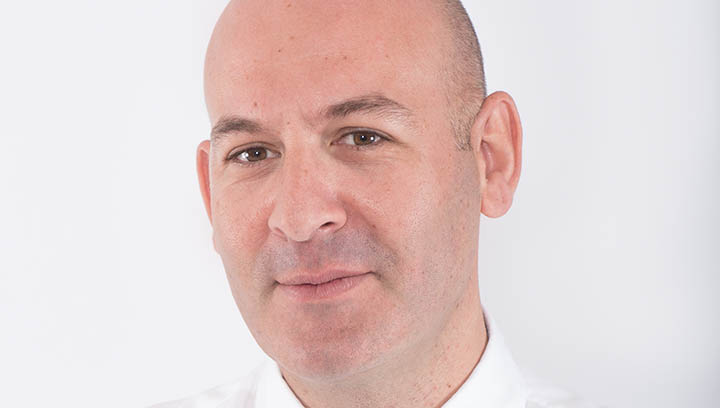- Topics
- Campaigning
- Careers
- Colleges
- Community
- Education and training
- Environment
- Equality
- Federation
- General secretary message
- Government
- Health and safety
- History
- Industrial
- International
- Law
- Members at work
- Nautilus news
- Nautilus partnerships
- Netherlands
- Open days
- Opinion
- Organising
- Podcasts from Nautilus
- Sponsored content
- Switzerland
- Technology
- Ukraine
- United Kingdom
- Welfare

Christian Ioannou is on a mission – to eliminate the use of ready meals and convenience foods onboard ships. The managing director of Cyprus-based Marine Catering Training Consultancy (MCTC) is truly passionate when he talks about the need to encourage healthy, nutritional menus for seafarers. Felicty Landon reports
As the saying goes, 'you are what you eat', and if we eat unhealthily we will be unhealthy, he says. But it's more than that. A seafarer who eats well is more alert. That surely translates into a safer ship and less likelihood of accidents.
Is there resistance? MCTC, which provides a wide range of catering management and training services, all focused on healthy, balanced diets, obviously comes up against the reality onboard.

'Of course, you will have some crew who just want to eat sausages every day or who are hesitant in following particular guidelines,' Mr Ioannou says. 'Others understand what we want to provide.
'The younger generation, especially millennials, are looking for something healthier. Many are vegetarians. This generation has three priorities: work/life balance, access to the internet and healthy food. If you don't as a shipowner provide these options, most probably you will not have any crew in a few years' time.'
It is, in any case, the duty of employers to make sure that seafarers are well fed, he says. The trends are encouraging – apparently, many shipowners and managers are looking more closely at food and are keen to make better choices.
'Healthy eating is a trend everywhere in the world,' Mr Ioannou points out. 'An industry which needs to pick up a lot on that is the shipping industry. We see more disease and illness on ships related to poor diet, including diabetes and obesity, and they really do need to catch up with the trend towards healthier living. But we are getting there.'
We see more disease and illness on ships related to poor diet, including diabetes and obesity
MCTC provides a range of marine catering training programmes and workshops, including distance learning and guidance, onboard training and onshore courses at its training centre in Manila. Its catering management service works with vessels to plan menus and coordinate the supply and delivery to ships of all catering provisions – with training tailored to the provisions that it knows are available.
‘We work with crewing departments and top management to make sure we coordinate with the ships, and we work with captains to ensure they will be involved in the process and understand what is involved,’ Mr Ioannou says. ‘We arrange the whole supply of the ship with fresh produce every two to three weeks, and also regularly stock up with frozen and dry goods.
‘We are in constant contact with the captain and owner to make sure we are aware of the schedule of ships. We work with reputable good-quality suppliers to ensure we get the produce to the ship. There is a lot of logistics and hard work for our catering management team.’
The emphasis is on a balanced diet menu to make sure seafarers take in the required nutrients. He is frequently taken aback by how little people actually know about nutrition – the basics of calculating calories or the dangers of excessive sugar and salt consumption.
‘We have to change mindsets to make sure they will be producing meals from scratch onboard ship. Our primary aim is no ready meals, no ready food.’
The recommended maximum sugar intake is 25 grammes per person per day. One cola drink easily exceeds that. During training sessions, MCTC has asked participants to put teaspoons of sugar in a glass based on daily sugar consumption. In many cases people have filled two glasses. ‘That included added sugar used in bread, soda drinks, soft drinks, Nutella, tomato ketchup – it is everywhere.’
What about national food preferences that are heavy on fat or salt? Mr Ioannou says national dishes are not necessarily unhealthy in themselves: ‘It is just that these dishes have often by replaced by ready convenience versions, with a mix of chemicals and sugar, etc., and the body just can’t metabolise the ingredients.’
MCTC did a cost analysis report on self-made meals versus using convenience foods/ingredients, comparing items such as bakery products, soups and dressings. The result: not only a lot less sugar and fewer calories in the ‘home-made’ version, but also a 15% improvement in the budget.
‘When I was a chef in Germany, the first thing the executive chef did when he entered the kitchen was to look not at what we were cooking, but at what was in the garbage bin, to see what was in there and ask: “Why haven’t you used that?”’
Part of that, of course, is understanding how to store and rotate food to ensure maximum freshness. ‘It’s about utilisation and optimisation of what you have on board. A chef should be able to produce meals with whatever is available.’
Mr Ioannou says he is amazed by the number of people who eat unhealthily and are then surprised when they get sick. ‘If we don’t take care of our bodies, it is just a matter of time before we are going to get sick. It is as simple as that.’
Tags
